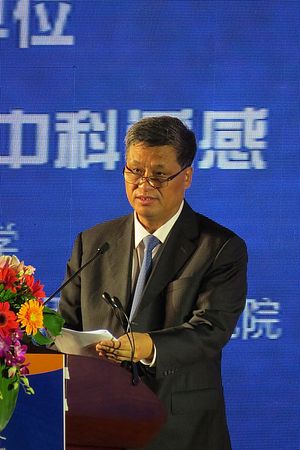If the recent Chinese government appointments are any indication, then the political woes of Hong Kong have become a valuable tool in the hands of Xi Jinping.
At the end of 2016, a number of prominent changes were made to governing positions within the southern province of Guangdong and the semi-autonomous cities of Hong Kong and Macau.
Beijing has appointed a computer scientist and cybersecurity expert as a deputy chief of its Liaison Office in Hong Kong. Xinhua announced on Friday that 52-year-old Dr. Tan Tieniu would become the office’s seventh deputy director; he is also the youngest. Tan was formerly vice president of the Chinese Academy of Sciences, and his elevation is widely seen as an effort to influence academia and professional elites.
The move comes after Song Zhe, the foreign ministry’s commissioner in Hong Kong since 2012, was named a deputy director of the State Council’s Hong Kong and Macau Affairs Office in Beijing as part of a reshuffle that also saw the sudden removal of another deputy director, Zhou Bo, without explanation.
According to local pro-Beijing newspaper Sing Pao, Zhou and the current director of the Liaison Office in Hong Kong, Zhang Xiaoming, are no longer in favor in Beijing. This comes shortly after incumbent chief executive CY Leung announced he would not be seeking re-election in 2017.
It is important to note that Sing Pao has been running a rare and daring campaign against the powerful Liaison Office in Hong Kong, as well as CY Leung, in recent months. The newspaper has been loud in its accusations that CY Leung and Zhang are destroying the fabric of Hong Kong in a bid to consolidate their own political powers.
The appointment of Tan in Hong Kong could also be an economically significant move as well. His elevation is in line with the recent announcement of Ma Xingrui as the new governor of Guangdong. Ma was most recently the top official overseeing the hi-tech region of Shenzhen, Hong Kong’s northern neighbor, referred to as the Silicon Valley of China. Before that, he had an extensive career at the China National Space Administration. China is acutely aware that it is losing its traditional competitive edge of cheap labor and low production costs to its Southeast Asian neighbors, and intends to drive the economy through the technology sector.
However, this could all be part of wider Chinese political power plays, as Zhou Bo is said to be protected by the powerful senior official Zhang Dejiang, as well as China’s ex-leader Jiang Zemin. Political commentators have highlighted the undercurrent of animosity between Jiang and current Chinese President Xi Jinping, who is said to be in the process of consolidating his power across the country with Jiang high on his hit list.
According to Peng Peng, a researcher at the Guangzhou Academy of Social Sciences, neither Tan nor Ma have political affiliations with former presidents Jiang or Hu Jintao. The selection of Ma in particular showed the central government’s desire to increase its control over Guangdong.

































